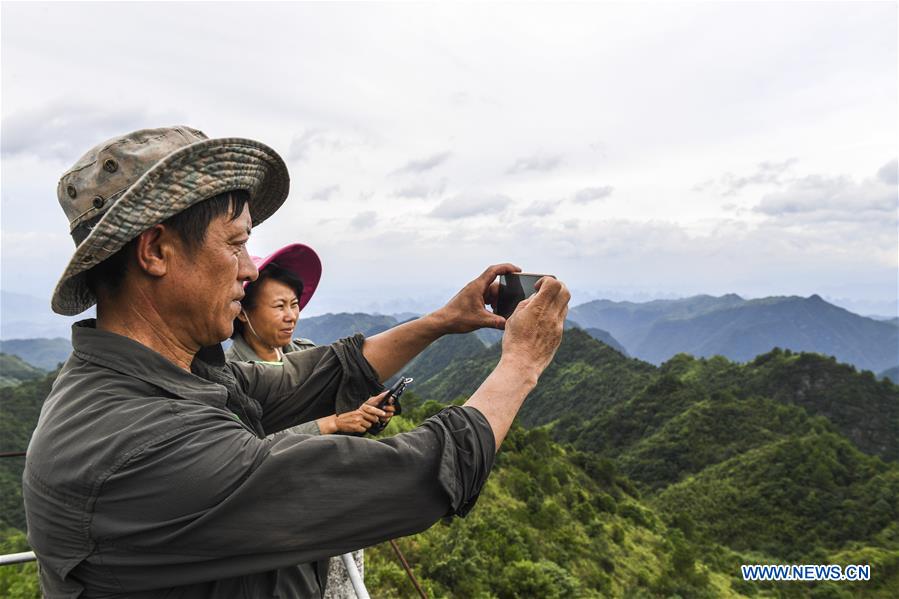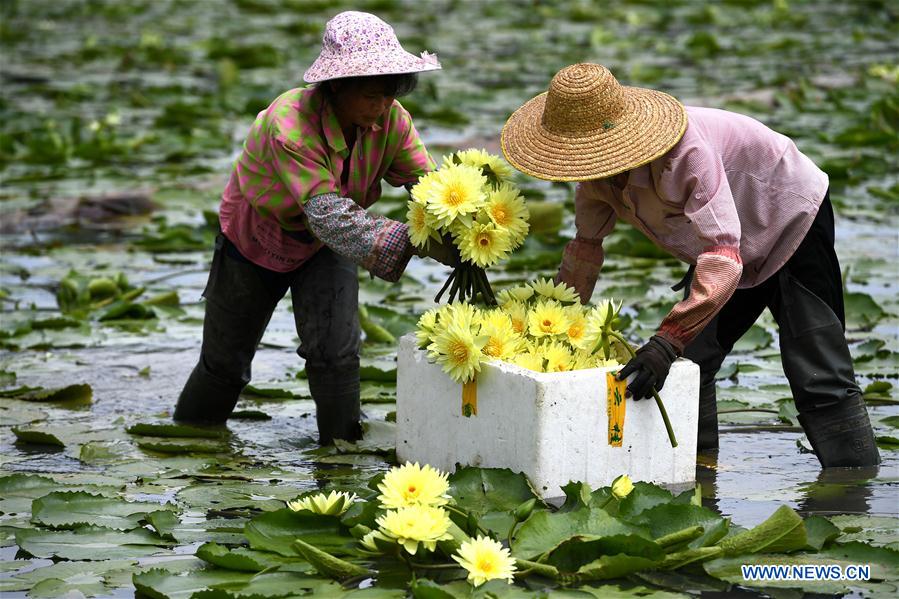
Huang Tongfu and his wife Huang Rixiu take photos at the top of an observation building in the Dayao Mountain National Nature Reserve in Jinxiu Yao Autonomous County, south China's Guangxi Zhuang Autonomous Region, July 9, 2020. Huang Tongfu, 48, has devoted himself to patrolling the Dayao Mountain National Nature Reserve for 14 years. His spouse, Huang Rixiu, the same age as him, was hired as a forest ranger in 2017. (Xinhua/Cao Yiming)
NANNING, Aug. 5 -- The crowing of roosters shatters the early morning silence enveloping the mist-shrouded Dayao Mountain in south China and wakes Huang Tongfu and his wife Huang Rixiu up from deep slumber.
The two rangers set out on patrol after breakfast carrying drinking water and some dry food, as well as sickles and walking sticks, as they walk along the rugged mountain paths.
Huang Tongfu, 48, has devoted himself to patrolling the Dayao Mountain National Nature Reserve for 14 years. His spouse, Huang Rixiu, the same age as him, was hired as a forest ranger in 2017.
Their duties include preventing forest fires, averting poaching activities and illegal logging, recording wild animals and rare plants, and raising awareness about forest conservation among villagers residing around the reserve.
At present, 66 rangers are patrolling the nature reserve, which is mainly located in Jinxiu Yao Autonomous County, south China's Guangxi Zhuang Autonomous Region. They have been on duty in 14 forestry stations, guarding the mountain all year round since the 1980s.
The couple from Longdaoshan forestry station is responsible for an area of about 1,667 hectares at an altitude of more than 1,200 meters. For at least 20 days each month, they tread along six patrolling routes through the woods, covering one route every day.
A typical workday usually starts at 8 a.m. with a bumpy motorcycle ride to the forest reserve, from where the husband and wife begin their trek along the winding trails to check the woodland.
"It's difficult to walk in the forest. The longest journey takes nearly seven hours to complete," said the husband.
The rough mountain roads always make them sweat, especially in summer. The couple trudges up the hill through the high weeds with sickles, sweating and burning under the scorching sun.
"I got soaked within a few minutes," the wife said, wiping off beads of sweat on her face. In winter, the cold wind would permeate their sweat-drenched clothes and freeze them to the bones.
The road to an observation building is unsurfaced, posing great challenges to the couple when it rains or frosts. Some steep slopes are so narrow that a person can pass with only one foot while using a walking stick. A stumble might cause rangers to tumble down the slope and sustain injuries.
The reserve harbors more than 2,230 plant species and 480 species of wild animals. Bearing years of experience in patrolling the area, the duo can tell where boars, leopard cats, or other wildlife would appear.
Some wild animals like venomous snakes and boars could be a menace. "We must be cautious during the patrol," Huang Rixiu said. "I've seen wild boars several times. Just stay away from them because they only attack humans when they feel threatened."
Loneliness is another challenge in the secluded mountain area. The woodland is scarcely populated and has weak network signals. The couple has to rely on satellite phones to stay connected with the outside world.
"These long walks are boring, so we indulge in trivial conversations and sing folk songs to make the patrol less dull," said Huang Tongfu. They also cultivate various potted flowers at the forestry station to spice up the simple life.
Due to limited supplies, the couple rears livestock and grows plants for food around the station. In order to buy basic necessities, once a week they ride a motorbike to the nearest market, which is two hours away.
Even so, the living conditions in the station have seen a big improvement. Access to roads, tap water, and electricity has been realized in recent years.
"There was nothing when I came to the station. At first, I had to build a bamboo hut to live in and drink water from the mountain spring. Without paved roads, I needed to walk at least seven hours to the nearest market to purchase essentials like vegetables," he recalled.
The forestry station is like their second home. "We often stay here during the days off work," Huang Tongfu said. "When it came to festive occasions like the Chinese New Year, we brought our children here for a family reunion."
Despite boredom and hard work, the couple still loves their job. "We can enjoy the magnificent view in the mountains, especially during the sunset," said Huang Rixiu.
As the sun dips, the orange-gold aura stretches far and wide, manifesting the color of fire hearths and tangerines. Beneath the leafy shades of trees emanating golden rays under the setting sun, the gentle summer breeze soothes the couple as they head "home," and prompts a faint rustle in the bushes.
Due to their continuous efforts, not a single fire hazard has occurred in the forest. Since people's livelihoods and environmental awareness have improved over the years, more and more rare species could be seen in the reserve.
"Our hard work has paid off," the couple said with delight.
The reserve employed the local residents as forest rangers. Huang and his wife earn around 4,000 yuan (about 573 U.S. dollars) a month, with which they can afford a decent local life.
By the end of 2019, about 58,000 people in Guangxi had been hired as forest rangers on the government payroll. They are responsible for the management of forests taking up some 5.07 million hectares of land in the region.
"The mountains are our friends and trees, our neighbors. We will safeguard the lush mountains until the day we cannot walk anymore," said Huang Tongfu.













